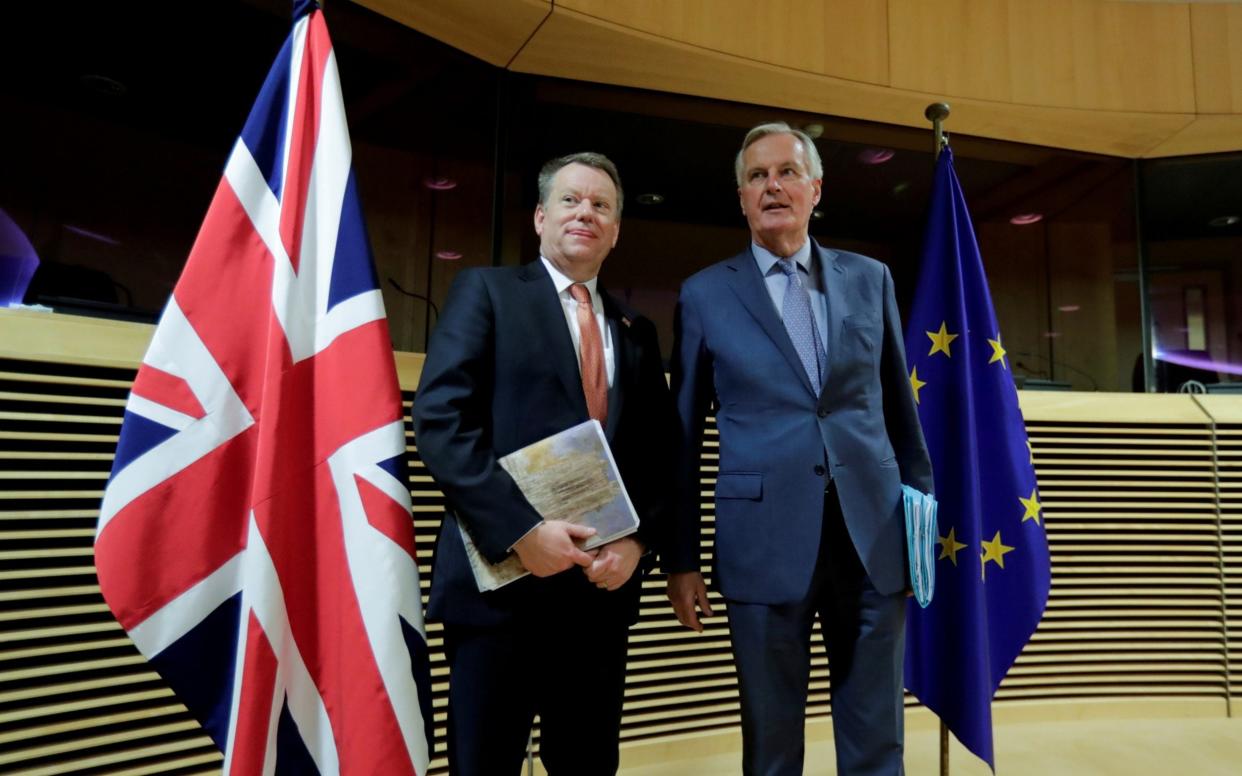Brexit deal: what has been agreed, and what happens next?

This was first published in The Telegraph's Refresher newsletter. For more facts and explanation behind the week’s biggest political stories, sign up to the Refresher here – straight to your inbox every Wednesday afternoon for free.
What's in the Boris Johnson Brexit deal and what are the issues?
After months of heated negotiations and an enormous amount of Parliamentary wrangling, the Withdrawal Agreement was finally signed in January.
The agreement sets out a myriad of conditions of the UK extricating itself from the EU, laying the groundwork for a trade deal with the bloc.
Included in the legislation – ratified in both Brussels and London – is the framework for how the UK will make “divorce bill” payments for years to come.
It sets out areas in which the European Court of Justice still plays a role in the UK and includes an arbitration procedure for disputes about the Withdrawal Agreement.
Perhaps most importantly, it also includes protocol for the border on the island of Ireland.
The issue has been one of the most contentious of the negotiations and continues to be a political hot potato to this day.
The overall aim of the protocol was to avoid the return of a "hard" land border between Northern Ireland, in the UK, and the Republic of Ireland, in the EU.
While the EU wants to protect the border with its bloc, there are fears that infrastructure such as cameras or border posts could become a target and lead to political instability.
However, the Government has ruffled feathers with new Brexit legislation going through Parliament.
The Internal Market Bill gives the Government powers to override sections of the protocol, which ministers have admitted breaks international law in a “limited and specific” way.
While it has passed the Commons, it is facing strong opposition in the House of Lords.
Peers voted overwhelmingly to remove a section of the bill that would allow ministers to break international law – by 433 votes to 165.
Former Conservative Party leader Lord Howard led the calls for the prime minister to "think again" and remove the contentious parts of the legislation, warning that the Government was using the language of "law breakers" everywhere.
Joe Biden even signalled his displeasure at the legislation.
During his election campaign the President-elect warned that any trade deal between the US and UK "must be contingent upon respect for" the Good Friday Agreement and "the return of a hard border" on the island of Ireland.
Issues around the implementation of the Withdrawal Agreement were supposed to be ironed out by the UK-EU joint committee chaired by Cabinet Office minister Michael Gove and Maroš Šefčovič.
However, several sticking points still remain.
What still needs to be negotiated?
Running in parallel to Mr Gove’s negotiations are trade talks between the UK and Brussels.
Led by chief negotiator Lord Frost and his EU counterpart Michel Barnier, the teams have managed to come to a consensus on many issues.
However, both sides are still struggling to bridge fundamental fault lines in talks concerning EU resistance to losing fishing rights in British waters and state aid.
Lord Frost’s team has proposed adopting a similar fishing arrangement to Norway, whereby fishing quotas would be agreed annually in shared fishing zones.
However, talks were said to be hampered by the “egregious” position of French President Emmanuel Macron.
Government sources said in recent weeks that Brussels negotiators, under pressure from France, had “not moved at all” leading to fresh deadlock.
Meanwhile, the EU is demanding Britain continue to accept rules that prevent the government from subsidising British companies at the expense of EU rivals.
What's the deadline?
The Brexit transition period ends on December 31.
The Government has repeatedly ruled out prolonging it further and legislated for a commitment not to agree to any extension.
However, it doesn’t necessarily mean that trade talks will come to a halt.
Negotiators are said to be exploring the idea of review clauses to break the deadlock in EU-UK trade talks, with the possibility that parts of the deal could be revisited several years after they take effect.
Brexit talks are continuing virtually this week after a member of the EU negotiating team tested positive for Covid-19.
With time running short to form an agreement by the end of Britain’s transition period on December 31, both sides could start to get creative.
Is a 'no-deal' Brexit still possible?
Some thought the departure of Boris Johnson’s most senior aide, the Vote Leave Svengali Dominic Cummings, would result in a softening of Downing Street’s stance.
However, Whitehall sources claim the Prime Minister remains the “hardest in the room” in his unwillingness to budge to secure a Brexit deal.
Our neighbours appear alarmed a no-deal Brexit remains a distinct possibility.
In recent days, France, Belgium and the Netherlands have appealed to the European Commission to accelerate contingency planning in case an agreement cannot be reached in time.
There may be an element of brinkmanship at play as well as necessary economic planning.
At home, Nigel Farage’s new party, Reform, is licking its lips and waiting should Mr Johnson allow fishing to be sacrificed as a make weight in any deal.
In the coming weeks this international game of political poker will finally come to head.
With the nation’s finances in a parlous state Mr Johnson needs a deal but the indications are he won’t sign an agreement that leaves him a hostage to fortune.

 Yahoo News
Yahoo News 
